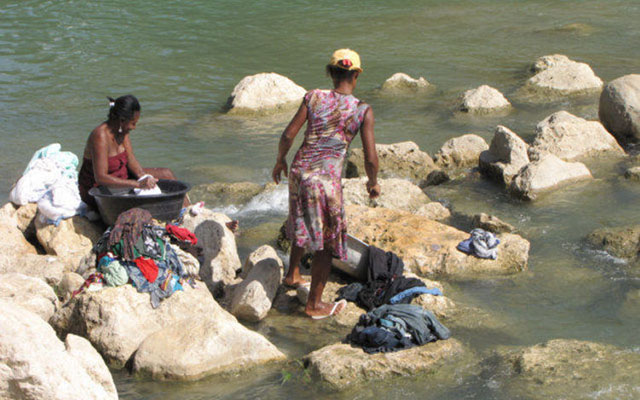The disappearing wisdom of elders


Only women were allowed at the bathing place, pachigezero chevakadzi. The grandmothers and all the village aunts, vanatete, guided us through many lessons on growing up responsibly
Sekai Nzenza On Wednesday
“Kumusha kwenyu kuchine chembere here?” asked this lady who was having her hair done next to me. (Do you still have old people in your village?) The question was not directed at me. No. This was part of a conversation between Maria, the hairdresser, Chamu the barber and others. My hair dressing shop is unisex.
This place used to be packed all the time with clients coming to be groomed and made beautiful. But not these days. Cash is a problem. Most of the time, you see the hairdressers, the barbers and those who do nails and pedicure sitting outside in the sun or inside the big open space where the clients come to get pampered. While Chamu twisted my hair, I said yes, in our village we still have Mbuya Magirazi. But I could not tell anyone about Mbuya Magirazi because it is not easy to have a conversation when your head is being moved around like a rag doll. I was enduring the painful movement of my head from left to right, from right to the front and back. Chamu is used to washing, massaging, twisting and plaiting so many people’s heads. Sometimes I think he does not see people. He sees heads and sees hair only.
“The oldest person in our village is probably 60-years-old or younger. Ah, what kind of a village is that? So who provides education and wisdom to the young?” asked the tall guy, who often comes in to sell fish from a big bag. Everyone calls him VaHove. This man seems to know the time and day that I come to the hairdresser because I never miss him,” said Maria. He usually walks in with smoked and dried fish already packed in small plastic bags, selling for a dollar each. Instead of giving Chamu a tip, I buy a packet of fish for him and also for Maria.
“Old people are becoming extinct in many villages,” said Chamu. I immediately thought of all the old people, who used to live in our village and in the villages near us. There was my grandmother, Mbuya VaMandirowesa. She used to round us all up and take us to the river for lessons. The river was a place of learning for us during the dry season. We would rush home from school, grab a bucket and go to the river to fetch water and meet other girls and boys.
At bathing time, the boys disappeared to their swimming spot and we had our bathing place, which belonged to women only. Mbuya VaMandirowesa was joined by several women at the river. Only women were allowed at the bathing place, pachigezero chevakadzi. The grandmothers and all the village aunts, vanatete, guided us through many growing up lessons. Here we were given lessons on womanhood. At the men’s bathing spot, we knew that young boys were getting lessons about manhood from the grandparents and the uncles. After the lessons, we swam in the river while our clothes hung on the tree branches to dry. We played and sang garwe herisadza; crocodile here is your sadza. One person was the crocodile and everyone else teased “him” pretending to give him sadza. The crocodile danced and sang “swederera”, get closer, until he pounced on one of us and ran away to “eat” her. We learnt to swim that way, running away from the “crocodile”.
Naked, we did cartwheels in the river sand. Then we sang and danced on the rocks, swam, rolled in the river sand and jumped in the water many times. We scrubbed and massaged each other’s backs with stones and compared the sizes of our budding breasts. We took nyungururwi — the black river insects from the water and got them to bite our nipples. The bites were sharp and painful. We believed that nyungururwi would make our breasts grow big. Mbuya said the more pain we felt, the bigger the breasts would become. It worked for others, but not for most of us.
Mbuya VaMandirowesa did not pay any attention at all to what we were learning at school. She was busy with the affairs of the village compound. In those days, Mbuya used to rule this village. Mbuya was a tall and formidable woman, the daughter of Chief Kwenda. With her back bent a little, she often walked with hands clasped behind her back. Her face had a deep dark brown colour. Imposing and barefoot, she walked around the village compound, inspecting and examining everything with her sharp eagle eyes. On each of her cheek bones were two small black tattoo lines, nyora, and the traditional marks of beauty. Her whole stomach was covered with these various patterns of beautiful nyora. She was full of wisdom gained from her ancestors.
But Mbuya VaMandirowesa, Sekuru Dickson and all the elderly people, including my mother are gone now. The oldest person in our village is Mbuya Magirazi. If you want to find a man or a woman her age, you will have to cross the Save River to Mbire where I gather there is a man, who is over a hundred years old. Young men still go to him to ask for help in marital issues. If you then travel in Chikomba towards Buhera, you will find another old woman called Mbuya Maguri. She is ancient. She cannot see, but her memory is still very sound. She is able to give instruction on how to make the seven day brew.
Mbuya Magirazi is around 90 years old. She does not know her real age. But we can calculate it if we look back to the time when her parents were relocated here after the Land Apportionment Act of 1930. This was the time when the colonial government divided the country into the Reserves or Tribal Trust Lands, meaning this was the land set aside exclusively for occupation by Africans. The good fertile land was reserved for the colonial settlers who became farmers on our land without paying for it. Mbuya Magirazi is still able to recall a time when she was a young girl and her family was moved from the Svosve area to the rocky hills of Dorowa in Buhera. She talks about hondo yemaGerimani, meaning the war against the Germans, which is World War Two.When I was growing up, Mbuya Magirazi was not called Mbuya or grandmother although she would have been in her fifties. She came to the river to talk to us about life and womanhood. Sometimes, she taught us many games and made comments meant for women’s ears only.
These days Mbuya Magirazi often comes over to sit with us at our homestead. She used to wear big spectacles that her grandson bought in South Africa. She was the first old lady to wear glasses in our village so everyone called her Mbuya Magirazi, or Grandma Spectacles. She does not wear spectacles anymore because when the last pair broke, there was no money to replace her glasses. Soon after losing her glasses, Mbuya joined the Zionist Mbungwe church. Now she claims that God has made her see much better than when she had glasses. But some varoora, those women who joke with Mbuya Magirazi, say Mbuya was never going blind any way. She simply wanted attention by wearing glasses.
“My grandmother is still alive. She is the village midwife and spirit medium. She also advises on rain making ceremonies. When she goes, we shall lose so much wisdom,” said VaHove. A lady having her eyebrows waxed said the wisdom we used to get from the elders can be found on the internet. Other people laughed. VaHove said the internet will never be able to give us the wisdom of the elderly that was passed on from generation to generation.
“Saka toita sei kuti tiwane ruzivo rwechembere?” I asked, having managed to free my head from Chamu’s busy hands for a brief moment.
“Go back to the village and take videos of them. Record their voices. That is what I do all the time when I visit the village. This way, my children will at least remember what our elderly people taught us,” said a well-dressed man who was having his just shaved head massaged. I wished there was technology when Mbuya VaMandirowesa and all the other elders were alive. Today, we would be watching videos of the past, remembering what it used to be like when we were educated by the elders down at the river or around the fire in the village hut, when it was full moon. We must use technology to capture the wisdom of the elderly before they leave us.
Dr Sekai Nzenza is a writer and cultural critic.







Comments